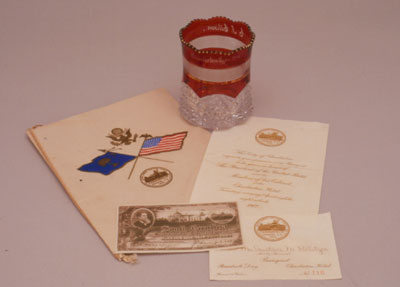
Click on the image for a larger view
Clockwise from left:
Banquet booklet honoring the President of the United States
Charleston, S.C., April 8, 1902
Paper, ink, and cord
South Carolina Historical Society
Souvenir cup from the South Carolina Inter-State and West Indian Exposition
Charleston, S.C., 1901–1902
Glass
Brith Sholom Beth Israel
Gustave M. Pollitzer’s banquet invitation
Charleston, S.C., 1902
Paper and ink
South Carolina Historical Society
Admission card to President’s Day banquet
Charleston, S.C., 1902
Paper and ink
South Carolina Historical Society
Ticket to South Carolina Inter-State and West Indian Exposition
Charleston, S.C., May 22, 1902
Paper and ink
South Carolina Historical Society
|
|
Gustave M. Pollitzer, born in New York in 1853, moved from Beaufort to Charleston at age 16 and married Clara Guinzburg of Baltimore, a graduate of New York’s Hunter College. The Pollitzers’ three daughters, Mabel, Carrie, and Anita, would become champions of equal rights for women, and their son, Richard, a pediatrician at the Medical College of South Carolina. Gustave Pollitzer was a successful cotton factor and, like his father, won acceptance to the upper echelons of lowcountry society. He supported Wade Hampton’s successful bid for governor in 1876 which brought an end to carpetbag rule in the state. He was elected to the South Carolina Society in 1891, served as commissioner of the city hospital and the public schools, vice-president of Kahal Kadosh Beth Elohim, president of the Hebrew Benevolent Society, and member of the Board of Health and the Committee of the Fireman’s Relief Fund. He was on the Committee on Arrangements for the South Carolina Inter-State and West Indian Exposition of 1901–02, and when President Theodore Roosevelt was feted in Charleston, Gus Pollitzer was among the honored guests.
|

